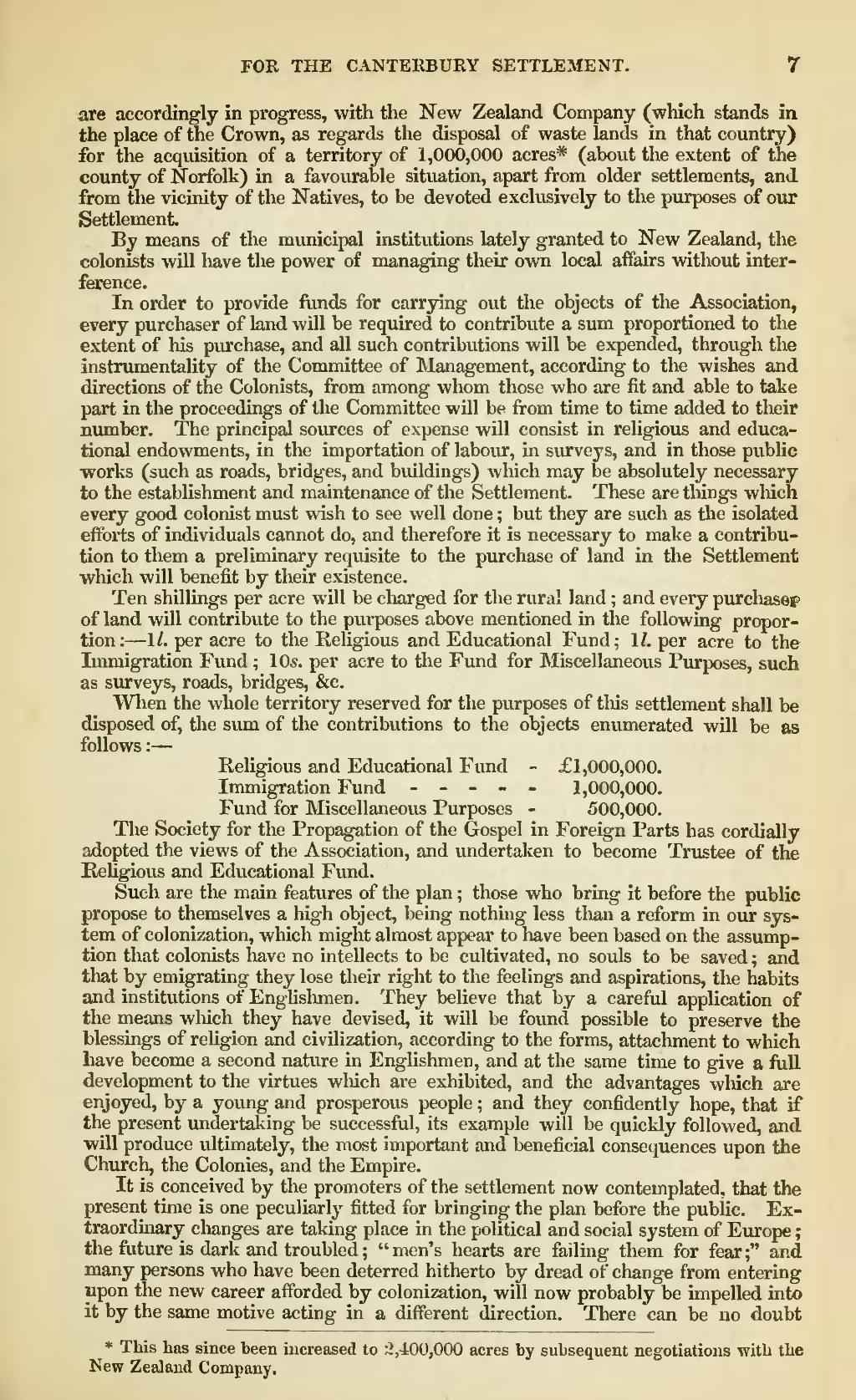are accordingly in progress, with the New Zealand Company (which stands in the place of the Crown, as regards the disposal of waste lands in that country) for the acquisition of a territory of 1,000,000 acres[1] (about the extent of the county of Norfolk) in a favourable situation, apart from older settlements, and from the vicinity of the Natives, to be devoted exclusively to the purposes of our Settlement.
By means of the municipal institutions lately granted to New Zealand, the colonists will have the power of managing their own local affairs without interference.
In order to provide funds for carrying out the objects of the Association, every purchaser of land will be required to contribute a sum proportioned to the extent of his purchase, and all such contributions will be expended, through the instrumentality of the Committee of Management, according to the wishes and directions of the Colonists, from among whom those who are fit and able to take part in the proceedings of the Committee will be from time to time added to their number. The principal sources of expense will consist in religious and educational endowments, in the importation of labour, in surveys, and in those public works (such as roads, bridges, and buildings) which may be absolutely necessary to the establishment and maintenance of the Settlement. These are things which every good colonist must wish to see well done; but they are such as the isolated efforts of individuals cannot do, and therefore it is necessary to make a contribution to them a preliminary requisite to the purchase of land in the Settlement which will benefit by their existence.
Ten shillings per acre will be charged for the rural land; and every purchase of land will contribute to the purposes above mentioned in the following proportion:—1l. per acre to the Religious and Educational Fund; 1l. per acre to the Immigration Fund; 10s. per acre to the Fund for Miscellaneous Purposes, such as surveys, roads, bridges, &c.
When the whole territory reserved for the purposes of this settlement shall be disposed of, the sum of the contributions to the objects enumerated will be as follows:—
| Religious and Educational Fund | £1,000,000. |
| Immigration Fund | 1,000,000. |
| Fund for Miscellaneous Purposes | 500,000. |
The Society for the Propagation of the Gospel in Foreign Parts has cordially adopted the views of the Association, and undertaken to become Trustee of the Religious and Educational Fund.
Such are the main features of the plan; those who bring it before the public propose to themselves a high object, being nothing less than a reform in our system of colonization, which might almost appear to have been based on the assumption that colonists have no intellects to be cultivated, no souls to be saved; and that by emigrating they lose their right to the feelings and aspirations, the habits and institutions of Englishmen. They believe that by a careful application of the means which they have devised, it will be found possible to preserve the blessings of religion and civilization, according to the forms, attachment to which have become a second nature in Englishmen, and at the same time to give a full development to the virtues which are exhibited, and the advantages which are enjoyed, by a young and prosperous people; and they confidently hope, that if the present undertaking be successful, its example will be quickly followed, and will produce ultimately, the most important and beneficial consequences upon the Church, the Colonies, and the Empire.
It is conceived by the promoters of the settlement now contemplated, that the present time is one peculiarly fitted for bringing the plan before the public. Extraordinary changes are taking place in the political and social system of Europe; the future is dark and troubled; "men's hearts are failing them for fear;" and many persons who have been deterred hitherto by dread of change from entering upon the new career afforded by colonization, will now probably be impelled into it by the same motive acting in a different direction. There can be no doubt
- ↑ This has since been increased to 2,400,000 acres by subsequent negotiations with the New Zealand Company.

